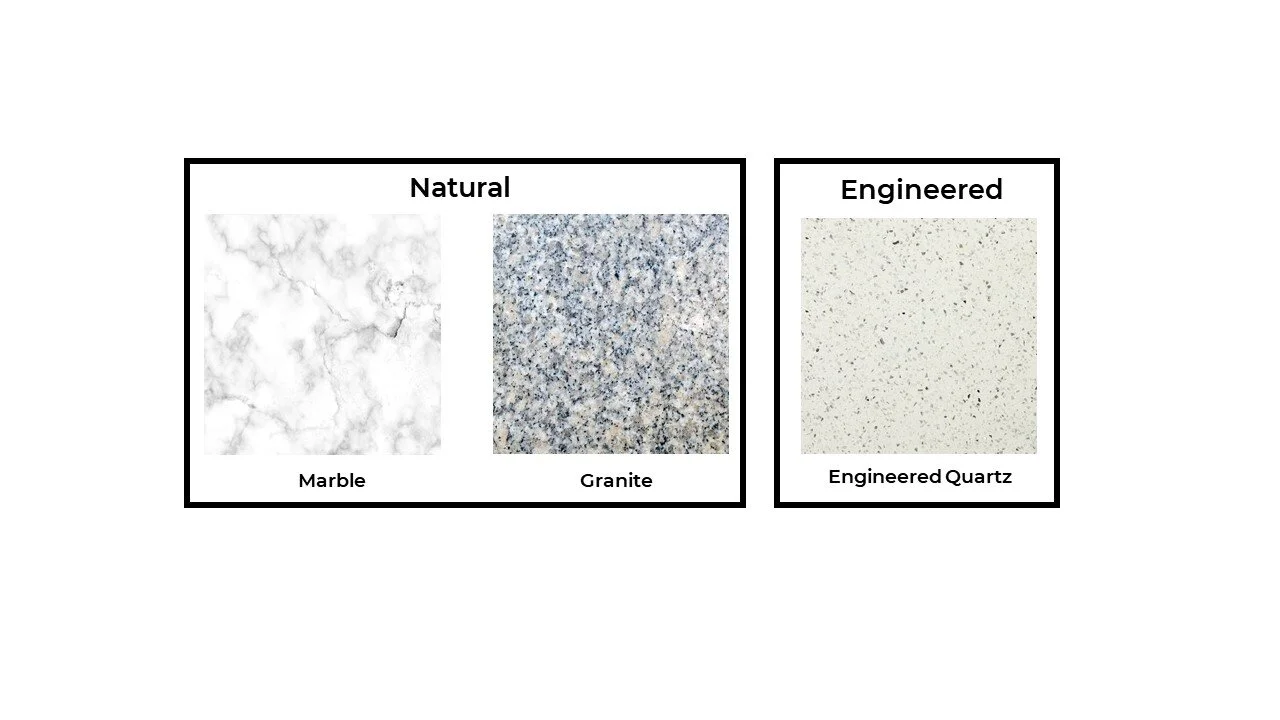Natural Stone or Engineered?
Marble is a metamorphic rock composed of recrystallized carbonate minerals, most commonly calcite or dolomite. In geology, the term marble refers to metamorphosed limestone, but its use in stone masonry more broadly encompasses unmetamorphosed limestone. Marble is commonly used for sculpture and as a building material.
Granite Granite is a light-colored igneous rock with grains large enough to be visible with the unaided eye. It forms from the slow crystallization of magma below Earth's surface. Granite is composed mainly of quartz and feldspar with minor amounts of mica, amphiboles, and other minerals. This mineral composition usually gives granite a red, pink, grey, or white color with dark mineral grains visible throughout the rock.
Engineered Quartz (not to be confused with Quartzite, another appealing natural stone used as counters) is a man made product created mostly from natural materials. It's made of 90 to 94 percent ground quartz and 6 to 10 percent resins and pigments that are combined into durable and nonporous slabs.
APPEARaNCE
Natural Stone
Natural stone is quarried, not manufactured, which means that no two pieces are alike making each piece you chose distinctive and one of a kind. Texture and color vary in each piece of stone giving each stone a unique appearance that cannot be duplicated.
Engineered Quartz
Most people love the appearance of Engineered Quartz, but others say it looks fake and cheap. Bottom line—with Engineered Quartz, the design options are virtually limitless.
PRICE
Marble, Granite and Quartz counter tops are priced similarly per square foot.
Natural stone counters have a wider variation in price. Natural stone can be more expensive than Engineered Quartz at times, based on the availability of a color and pattern.
But sometimes Engineered Quartz is more expensive due to the treatments it receives during manufacturing.
Durability
Both Marble and Granite counter tops are quite durable, but ONLY if they are properly sealed every one or two years. Marble and Granite are porous, so without a seal, liquids will penetrate and stain. When the seal fades and is not replaced, these stones can be easily marred by oil, wine, juice and anything acidic.
Engineered Quartz has a durable, non-porous surface that is both scratch and abrasion-resistant, allowing it to maintain its original luster. Clean up is easily handled with soap and water, and it doesn't require sealing.
Maintenance and Cleaning
Natural Stone
With the advancements in Polymers and Nanotechnologies, very effective and long lasting sealers are available for granite stain protection, reducing the need of yearly applications of sealer to the granite counter tops.
The way you maintain your granite counter can also have an effect on the frequency of resealing. If you use chemicals on the granite that wear away or weaken the sealant, you will need to reseal more often.
Warm water, mild dish washing liquid, and soft clean cloth are generally all that's needed to maintain your granite counter top surface. The best care you can give your natural stone is preventive care. Your counter tops will last a lifetime while maintaining a brand-new appearance.
Engineered Quartz
Counter tops are easy to clean and maintain. Warm water and soap are recommend for day-to-day cleaning. For a stubborn spill, you can use a nonabrasive cleaner such as Soft Scrub, or Magic eraser.
Porous properties and staining
Natural Stone
Granite is one of the least porous natural stones. We apply a sealer to granite counter tops before they are installed which will protect them from absorbing liquids too quickly. Being porous is not necessarily a bad quality.
That is not the case with Marble. Marble counter tops are very porous and stain quiet easily. They require re-sealing once every few months.
Engineered Quartz
Engineered Quartz is non-porous so it resists staining much better than granite, marble and concrete. It stands up to juice, oil, wine, tomato, coffee and other sources of stains in the kitchen. For cleanliness, a non-porous surface means that it will not harbor bacteria or viruses.

